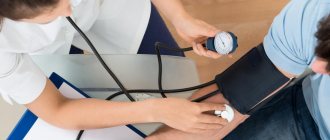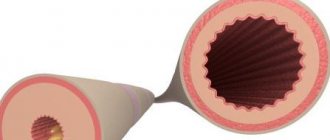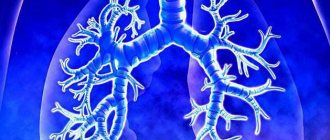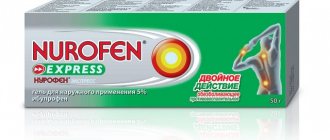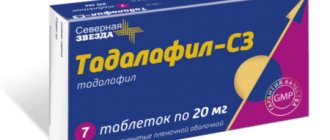Nurofen forte
From the digestive system: NSAID gastropathy (nausea, vomiting, abdominal pain, heartburn, loss of appetite, diarrhea, flatulence, pain and discomfort in the epigastric region), ulceration of the gastrointestinal mucosa (in some cases complicated by perforation and bleeding); irritation, dryness of the oral mucosa or pain in the mouth, ulceration of the gum mucosa, aphthous stomatitis, pancreatitis, constipation, hepatitis.
From the respiratory system: shortness of breath, bronchospasm.
From the senses: hearing loss, ringing or noise in the ears, reversible toxic optic neuritis, blurred vision or diplopia, dryness and irritation of the eyes, swelling of the conjunctiva and eyelids (allergic origin), scotoma.
From the nervous system: headache, dizziness, insomnia, anxiety, nervousness and irritability, psychomotor agitation, drowsiness, depression, confusion, hallucinations, rarely - aseptic meningitis (more often in patients with autoimmune diseases).
From the cardiovascular system: development or worsening of heart failure, tachycardia, increased blood pressure.
From the urinary system: acute renal failure, allergic nephritis, nephrotic syndrome (edema), polyuria, cystitis.
Allergic reactions: skin rash (usually erythematous, urticaria), skin itching, angioedema, anaphylactoid reactions, anaphylactic shock, bronchospasm, fever, erythema multiforme exudative (including Stevens-Johnson syndrome), toxic epidermal necrolysis (Lyell's syndrome) , eosinophilia, allergic rhinitis.
From the hematopoietic organs: anemia (including hemolytic, aplastic), thrombocytopenia and thrombocytopenic purpura, agranulocytosis, leukopenia.
Other: increased sweating.
The risk of developing ulcerations of the gastrointestinal mucosa, bleeding (gastrointestinal, gingival, uterine, hemorrhoidal), visual impairment (impaired color vision, scotoma, amblyopia) increases with long-term use in large doses. Overdose. Symptoms: abdominal pain, nausea, vomiting, lethargy, drowsiness, depression, headache, tinnitus, metabolic acidosis, coma, acute renal failure, decreased blood pressure, bradycardia, tachycardia, atrial fibrillation, respiratory arrest.
Treatment: gastric lavage (only within an hour after administration), activated charcoal, alkaline drinking, forced diuresis, symptomatic therapy (correction of CBS, blood pressure).
Contraindications
This drug should not be used in the following cases:
- high sensitivity to the components of the drug;
- a history of high sensitivity to other drugs from the NSAID group, intolerance to acetylsalicylic acid;
- erosions and ulcers of the gastrointestinal tract during an exacerbation;
- disorders in the process of blood clotting, hemophilia;
- intracranial hemorrhages, gastrointestinal bleeding;
- recovery period after coronary artery bypass surgery;
- renal failure;
- liver diseases, liver failure ;
- confirmed hyperkalemia ;
- pregnancy period ;
- The patient's age is up to 12 years.
The medicine should be taken with caution by elderly people, as well as patients suffering from heart failure, coronary artery disease, diabetes mellitus , hypertension, cerebrovascular diseases, liver cirrhosis , dyslipidemia, peripheral arterial diseases, liver, kidney failure, peptic ulcers, colitis, enteritis, nephrotic syndrome and others severe somatic diseases.
Those who frequently drink alcohol or smoke should be treated with caution.
special instructions
It is recommended to take the drug for the shortest possible course and in the minimum effective dose necessary to eliminate symptoms. If you need to use the drug for more than 10 days, you must consult a doctor.
During the treatment period, ethanol intake is not recommended.
Women planning a pregnancy should take into account that the drug suppresses COX and prostaglandin synthesis, affects ovulation, disrupting female reproductive function (reversible after discontinuation of treatment).
pharmachologic effect
Non-steroidal anti-inflammatory drug. It has analgesic, antipyretic and anti-inflammatory effects.
The mechanism of action of ibuprofen, a derivative of propionic acid, is due to inhibition of the synthesis of prostaglandins - mediators of pain, inflammation and hyperthermic reaction. Indiscriminately blocks COX-1 and COX-2, as a result of which it inhibits the synthesis of prostaglandins. In addition, ibuprofen reversibly inhibits platelet aggregation. The analgesic effect is most pronounced for inflammatory pain. The effect of the drug lasts up to 8 hours.
Directions for use and doses
The drug is taken orally. The tablets should be taken with water. Patients with hypersensitivity of the stomach are recommended to take the drug with meals.
The drug is intended for short-term use only.
Adults and children over 12 years of age are prescribed 1 tablet. (400 mg) up to 3 times/day. The interval between taking tablets should be at least 6 hours.
The maximum daily dose is 1200 mg (3 tablets). The maximum daily dose for children and adolescents aged 12 to 18 years is 800 mg (2 tablets).
If symptoms persist or worsen when using the drug for 2-3 days, you should stop treatment and consult a doctor.
Interaction
When taken simultaneously, Nurofen Forte interacts with the following medications:
- with acetylsalicylic acid , with any other NSAIDs;
- with thrombolytic and anticoagulant (increases the likelihood of bleeding);
- with serotonin reuptake inhibitors (increases the likelihood of bleeding from the gastrointestinal tract);
- with cefoperazone, cefamandole, plicamycin, valproic acid, cefotetan (the likelihood of hypoprothrombinemia increases);
- with medications that block tubular secretion (the concentration of ibuprofen in plasma increases);
- with gold preparations and cyclosporine (nephrotoxicity increases, the likelihood of hepatotoxic effects increases);
- with inducers of microsomal oxidation (the likelihood of severe intoxication increases);
- with vasodilators (hypotensive activity decreases), with hydrochlorothiazide and Furosemide (natriuretic effect decreases);
- with uricosuric drugs (reduces their effectiveness), with antiplatelet agents, indirect anticoagulants, fibrinolytics (increases their effect);
- with estrogens, mineralocorticoids, glucocorticoids, ethanol (side effects increase);
- with insulin and oral hypoglycemic drugs (strengthens their effects);
- with cholestyramine and antacids (absorption of ibuprofen is reduced);
- with methotrexate, digoxin, lithium preparations (the concentration in the blood of these drugs increases);
- with caffeine (analgesic effect increases).
Analogs
Level 4 ATC code matches:
Artrum
Brustan
Ketonal Duo
Nurofen Plus
Nurofen Express
Nurofen Express Lady
Nurofen for children
Nurofen
Ibuprom
Ibuprofen
Advil
Mig 400
Has
Ketoprofen
Vimovo
Naproxen
Flexen
Nalgesin
Flamax
Novigan
Analogues of this medicine are products containing ibuprofen. These drugs are Advil , Burana , Ibuprom , Ibuprofen , Faspik , etc.
Price, where to buy
The price of a package of Nurofen Forte (12 tablets) averages 100 rubles.
- Online pharmacies in RussiaRussia
- Online pharmacies in UkraineUkraine
ZdravCity
- Nurofen Forte tablets p.p.o.
400 mg 12 pcs. Reckitt Benckiser Healthcare (UK) Limited RUR 104 order
Pharmacy Dialogue
- Nurofen Forte tablets 400 mg No. 12Reckitt Benckiser
97 RUR order
show more
Pharmacy24
- Nurofen Forte orange for children 200 mg/5 ml 100 ml suspension
104 UAH. order - Nurofen Forte suspension 200 mg/5 ml 100 ml strawberry No. 1 Reckitt Benckiser Healthcare(UK)LTD, Great Britain
103 UAH order
- Nurofen Forte 400 mg N12 tablets Reckitt Benckiser Healthcare International, Great Britain
78 UAH order
Nurofen – tablets, drops, capsules, syrup, suspension, tablets
From the digestive system: NSAID gastropathy (nausea, vomiting, abdominal pain, heartburn, loss of appetite, diarrhea, flatulence, pain and discomfort in the epigastric region), ulceration of the gastrointestinal mucosa (in some cases complicated by perforation and bleeding); irritation, dryness of the oral mucosa or pain in the mouth, ulceration of the gum mucosa, aphthous stomatitis, pancreatitis, constipation, hepatitis.
From the respiratory system: shortness of breath, bronchospasm.
From the senses: hearing loss, ringing or noise in the ears, reversible toxic optic neuritis, blurred vision or diplopia, dryness and irritation of the eyes, swelling of the conjunctiva and eyelids (allergic origin), scotoma.
From the nervous system: headache, dizziness, insomnia, anxiety, nervousness and irritability, psychomotor agitation, drowsiness, depression, confusion, hallucinations, rarely - aseptic meningitis (more often in patients with autoimmune diseases).
From the cardiovascular system: development or worsening of heart failure, tachycardia, increased blood pressure.
From the urinary system: acute renal failure, allergic nephritis, nephrotic syndrome (edema), polyuria, cystitis.
Allergic reactions: skin rash (usually erythematous, urticaria), skin itching, angioedema, anaphylactoid reactions, anaphylactic shock, bronchospasm, fever, erythema multiforme exudative (including Stevens-Johnson syndrome), toxic epidermal necrolysis (Lyell's syndrome) , eosinophilia, allergic rhinitis.
From the hematopoietic organs: anemia (including hemolytic, aplastic), thrombocytopenia and thrombocytopenic purpura, agranulocytosis, leukopenia.
Other: increased sweating.
The risk of developing ulcerations of the gastrointestinal mucosa, bleeding (gastrointestinal, gingival, uterine, hemorrhoidal), visual impairment (impaired color vision, scotoma, amblyopia) increases with long-term use in large doses.
Overdose.
Symptoms: abdominal pain, nausea, vomiting, lethargy, drowsiness, depression, headache, tinnitus, metabolic acidosis, coma, acute renal failure, decreased blood pressure, bradycardia, tachycardia, atrial fibrillation, respiratory arrest.
Treatment: gastric lavage (only within an hour after administration), activated charcoal, alkaline drinking, forced diuresis, symptomatic therapy (correction of CBS, blood pressure).
